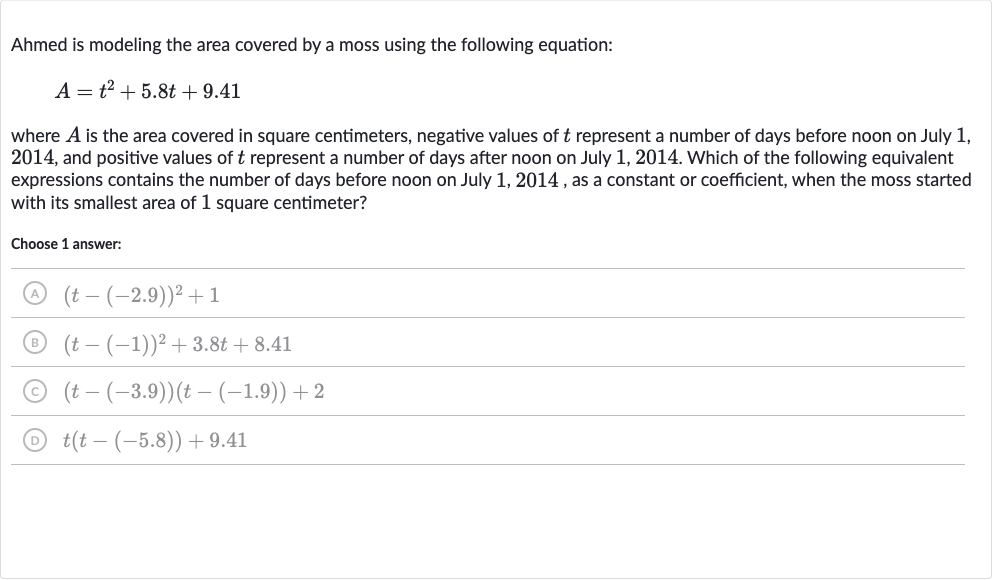AI tutor
Welcome to Bytelearn!
Let’s check out your problem:

Ahmed is modeling the area covered by a moss using the following equation:where is the area covered in square centimeters, negative values of represent a number of days before noon on July , , and positive values of represent a number of days after noon on July , . Which of the following equivalent expressions contains the number of days before noon on July , , as a constant or coefficient, when the moss started with its smallest area of square centimeter?Choose answer:(A) (B) (C) (D)
Full solution
Q. Ahmed is modeling the area covered by a moss using the following equation:where is the area covered in square centimeters, negative values of represent a number of days before noon on July , , and positive values of represent a number of days after noon on July , . Which of the following equivalent expressions contains the number of days before noon on July , , as a constant or coefficient, when the moss started with its smallest area of square centimeter?Choose answer:(A) (B) (C) (D)
- Identify Coefficients: We are given the quadratic equation , which represents the area covered by moss over time. We need to find an equivalent expression that shows the number of days before noon on July , , as a constant or coefficient, when the area was at its smallest value of square centimeter. To do this, we will complete the square to rewrite the given equation in vertex form, which will reveal the time at which the area was at its minimum.
- Complete the Square: First, we identify the coefficients of and in the given equation. The coefficient of is , and the coefficient of is . To complete the square, we take half of the coefficient of , square it, and add it to both sides of the equation.Half of is , and .
- Rewrite in Vertex Form: We add to both sides of the equation to maintain equality. However, since the original equation already has a constant term of , we need to subtract from the constant term to keep the equation balanced.
- Find Time of Minimum Area: Now we have the equation in vertex form, , which shows that the smallest area of square centimeter occurs when . This means that the moss started growing days before noon on July , .
- Compare with Answer Choices: We compare the vertex form equation with the answer choices given. The correct answer choice will have the same vertex form as the one we derived.
- Choose Correct Expression: Looking at the answer choices, we see that choice (A) is the equivalent expression that matches our derived vertex form. This expression contains the number of days before noon on July , , as a constant , when the moss started with its smallest area of square centimeter.
More problems from Area of quadrilaterals and triangles: word problems
QuestionGet tutor help
QuestionGet tutor help
QuestionGet tutor help
QuestionGet tutor help
QuestionGet tutor help
QuestionGet tutor help
QuestionGet tutor help
